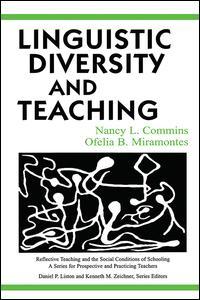Linguistic Diversity and Teaching Reflective Teaching and the Social Conditions of Schooling Series

Contents: Series Preface. Preface. Part I: Case Studies and Reactions. Introduction to Case 1. Case 1: The Cycle: Frank and Vu. Reader Reactions to Frank's Situation. Reactions to The Cycle: Frank and Vu. Reader Reactions to The Cycle: Frank and Vu. Summary and Additional Questions. Introduction to Case 2. Case 2: Marisa's Prospect's. Reader Reactions to Marisa and Jane's Situation. Reactions to Marisa's Prospects. Reader Reactions to Marisa's Prospects. Summary and Additional Questions. Introduction to Case 3. Case 3: Friendship, Professionalism, and Programs. Reader Reactions to Laura and Juana's Situation. Reactions to Friendship, Professionalism, and Programs. Reader Reactions to Friendship, Professionalism, and Programs. Summary and Additional Questions. Introduction to Case 4. Case 4: What Is Equal Treatment? Reader Reactions to Andrew's Situation. Reactions to What Is Equal Treatment? Reader Reactions to What Is Equal Treatment? Summary and Additional Questions. Part II: Public Arguments. English Is the Glue That Holds Our Nation Together. Bilingual Education Is a Must. A Pragmatic Approach. Part III: Final Arguments and Some Suggestions and Resources for Further Reflection. Our Perspective. Things Every Teacher Can Do. Summary and Final Comments. Exercises for Further Reflection. Conclusion.
Date de parution : 06-2017
15.2x22.9 cm
Date de parution : 07-2005
Ouvrage de 160 p.
15.2x22.9 cm
Mots-clés :
Language Learners; language; Primary Language Instruction; learners; Native English Speakers; native; Language Minority Students; english; ESL Student; speakers; English Language Learners; primary; ESL Teacher; minority; ESL Class; students; Bilingual Education; instruction; Bilingual Teacher; bilingual; Prospective Teacher; Elementary Bilingual Teacher; Master’s Candidate; ESL Program; Monolingual English Teachers; Common Language; Bilingual Programs; ESL Method; Professional Development; Immigrant Students; Elementary Teacher; Can; Primary Language; PTO Meeting; Monolingual English



